 Thanks to Students for Sustainability, UFV is about to get a whole lot greener: the group has taken the next natural step in reducing our ecological footprint by introducing several composting bins on campus. SFS teamed up with local gardening company The Answer and compost pick-up company Down-to-Earth to make the program possible; however, the initiative is currently only a pilot project that will run until the end of the Winter 2011 semester.
Thanks to Students for Sustainability, UFV is about to get a whole lot greener: the group has taken the next natural step in reducing our ecological footprint by introducing several composting bins on campus. SFS teamed up with local gardening company The Answer and compost pick-up company Down-to-Earth to make the program possible; however, the initiative is currently only a pilot project that will run until the end of the Winter 2011 semester.
The initiative has already collected over 426 pounds of compostable materials. The material collected at UFV is processed at The Answer, which is where UFV’s landscaping service gets the mulch and soil used on campus. “It is a circle of sustainability,” explained UFV Sustainability Coordinator Sheena Adams.
Compost bins are located in G Building at the Tim Hortons, in A Building at the Roadrunner Cafe and the Faculty Area, in the kitchen at U-House, and in Baker House. The most well-used bin so far has been the one located by the Tim Hortons, followed closely by the bin located in residence. Bracken Unruh of Down-to-Earth observed “It is apparent that students are collecting in their rooms and then bringing it to the pail in the common room as I find smaller bags inside the big one. It is very promising to see.” Behaviour such as this, combined with the large volume of compost collected so far, points to the potential future success of the program.
Students, staff, and faculty are encouraged to use the composting bins as an alternative to garbage cans for items such as coffee grinds, tea bags, egg shells, fruit and veggie waste, leftover food of any kind, paper coffee cups, paper towel, and paper plates. On the other hand, anything plastic or metal should not be composted, and compost bins to not double as recycling containers. Unruh encouraged anyone with questions to visit the UFV section of www.compostpickup.com, which lists items that can and cannot go in the pails, noting: “I add to it whenever I find something new that shouldn’t be there as I’m sorting.”
Composting is an essential component of waste reduction and key to any sustainability effort. Food waste, when left to end up in a landfill, produces methane gas – a powerful greenhouse gas that is over 20 times more efficient at trapping heat than carbon dioxide. By composting, food and garden waste is diverted out of the waste stream and rapidly-filling landfills, and instead can undergo “natural recycling.” With traditional composting, it once took up to a year to convert compostable materials into usable compost, but with the development of new industrial composting efforts, it is possible to convert large amounts of organic material into soil in as little as a few weeks.
Unruh said: “I keep a running tally of collections that I have done since the beginning of the pilot program. I hope that students will see the tally and know that, collectively, they make a difference even if all they personally contribute is a coffee cup or an apple core.


